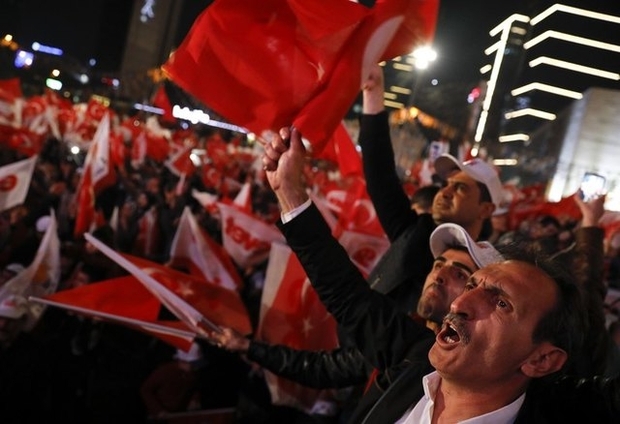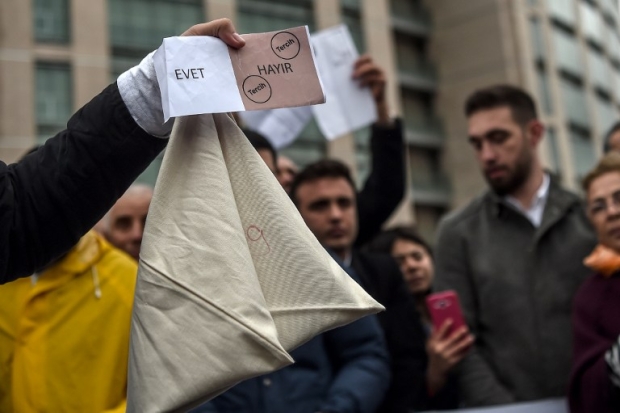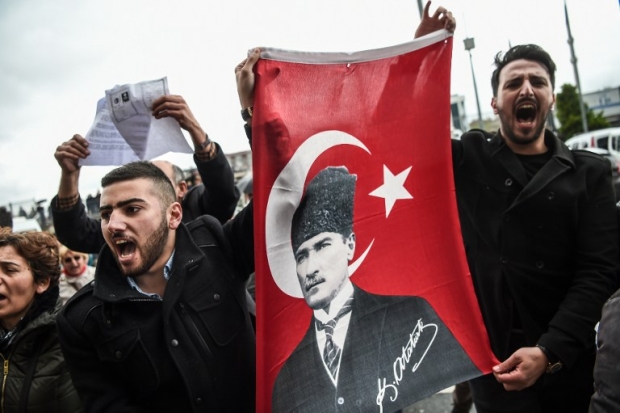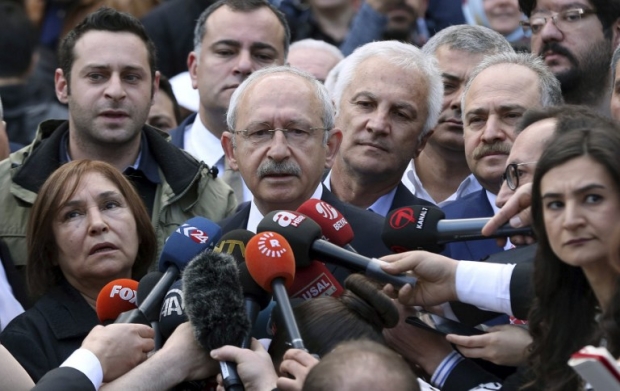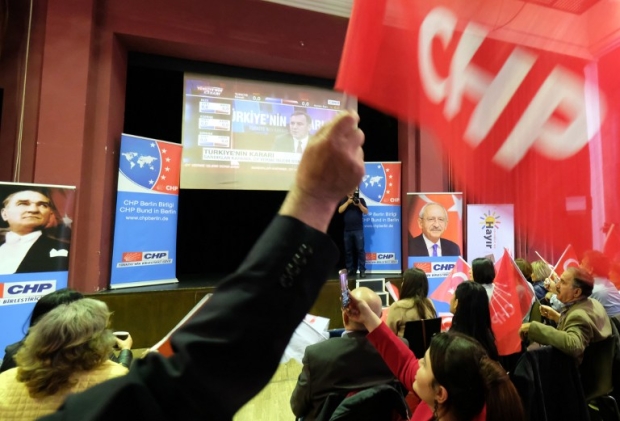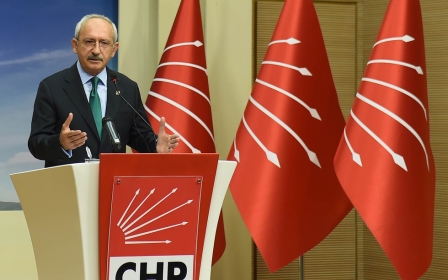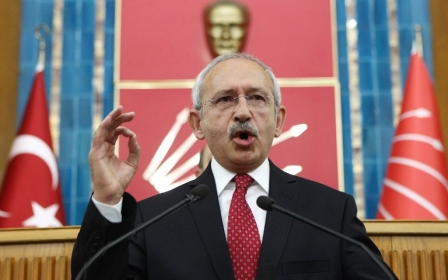Young Turks demand 'radical' opposition reform after referendum defeat
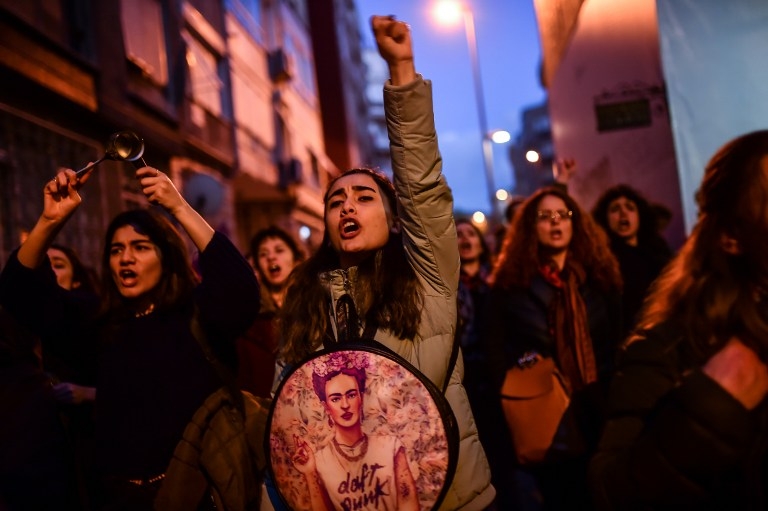
A new generation of Young Turks are calling for radical changes in the country's main opposition party after its narrow defeat in a referendum on presidential powers brought confused responses by leaders and exposed cracks within the rank and file.
The Republican People's Party (CHP), the party founded by Kemal Ataturk, backed the losing "No" campaign in the 16 April vote on turning Turkey's parliamentary system into an executive presidency.
But despite the party exposing what it said were mass violations in voting, leaders were accused of botching their response, including backing out of threats to pull out of parliament and refusing to back street protests against the result.
Now a group of young party members – dubbed the 20 April movement – are calling on the CHP's executive to shake off its air of "defeatism" and return it to radical roots and provide a solid opposition to the ruling AKP party.
'The party's leadership lost its focus at such a critical moment'
- Anil Aktas, 20 April platform founder
They believe, that now more than ever, that the CHP and its leader, Kemal Kilicdaroglu, needs to resist the AKP and the president, Recep Tayyip Erdogan.
"Our name, the 20 April movement, marks the day we saw a party leader and vice president contradict themselves," said Anil Kemal Aktas, one of the platform's founders and a former adviser to a CHP vice-president.
"This incident and previous crises were avoidable, but the party's leadership lost its focus at such a critical moment in time."
Another 20 April member, 32-year-old Ali Tirali, said: "While divisions within the party erupted as a result of the referendum, there has been growing dissent within the party's ranks, particularly among the youth.
"When Kilicdaroglu came to power, he gave us hope," said Tirali, who works at the Foundation for Social Democracy (SODEV). "But we quickly saw a return to opportunistic and bureaucratic policies."
"The party's executive committee has an obsession with moderation in politics. They are inert and inactive, giving off an impression of defeatism to the masses. The party should return to its radical roots."
But the group of reformists said their party flaked under the pressure and failed to capitalise on a unique opportunity to garner popular support to resist Erdogan.
The group, composed of about 30 to 40 mostly young CHP members, said their party should have adopted "radical" measures, to become more activist and build a stronger rapport on the streets and among the grassroots.
The establishment of the 20 April came after leading members within the party's executive committee made publicly inconsistent statements following the referendum.
It took two hours for CHP deputy chairman Levent Gok to overturn the declaration by party spokesperson Selin Sayek Boke that CHP would withdraw from parliament in response to alleged electoral violations. Gok said the move was "not appropriate".
'The party's executive committee has an obsession with moderation in politics. They are inert and inactive'
- Ali Tirali, CHP former youth branch member
The inconsistent declarations came after the party's deputy chairman Bulent Tezcan said the CHP would challenge the referendum results at the constitutional court and the European Court of Human Rights.
Meanwhile, hundreds of supporters of the "No" campaign took to the streets of Istanbul's Besiktas and Kadikoy – two CHP strongholds known for being staunchly secular and anti-Erdogan districts - to protest against the alleged poll violations.
The party refused to officially endorse them.
Calls for reform
In response, the group produced a declaration calling on the party's leadership to reform and take the lead in resisting the Erdogan and the ruling AKP.
At the party headquarters in Ankara, Aktas and his supporters read out the declaration "calling on the leadership to set new goals and develop a more dynamic framework to attract larger parts of the society," he told MEE.
"Objection! Passivism among CHP's leadership is an ever greater disappointment," read the declaration. "Today, we march on the headquarters of the CHP to object to the direction in which the party is heading."
The declaration made a number of calls for reform, including the development of a more inclusive manifesto for the party and and the introdution of a more radical approach to politics.
'We expected our leaders to become a compass for the many people who voted 'No', but they failed to inspire us and capitalise on this opportunity'
- Anil Aktas, CHP member
The CHP was founded on a secular, Kemalist ideology. In the 1920s Kemalists pursued a top-down project of radical modernisation in an ambitious drive to import European civilization.
Although CHP was the most powerful political party for decades after the modern republic's establishment in 1923, secular Kemalism barely infiltrated Turkish society at large.
The rural and pious masses of Anatolia remained largely unaffected by the cultural changes in Ankara, in contrast to the military, the bureaucracy, and the urban bourgeoisie, who embraced or adapted secular Kemalism.
Despite the "No" campaign, led by CHP, facing many challenges in the run-up to the referendum - including opponents of the package being compared by the pro-government side to terrorists and traitors and receiving almost no TV time for campaigning - 49 percent of the votes were against the amendments.
"It was really hard to get so many 'No' votes, but we did it. This was a positive sign," Aktas told MEE. "We expected our leaders to become a compass for the many people who voted against this move, but they failed to inspire and capitalise on this opportunity."
Moving into Anatolia
Referendum results from central Anatolian provinces showed that the "Yes" camp won convincingly, in spite of an active campaign against the proposal by dissidents from the Nationalist Movement Party (MHP), which is also strong there.
Members of the 20 April movement believe that CHP's elitist policies and rhetoric is to blame for this. They say the party has confined support for itself in mostly coastal and rich provinces, such as Izmir and Antalya, leaving the majority of Turkey's Anatolian heartland untapped.
'There is no democracy withing CHP's congress. Only rich and educated people can enter leadership positions all of whom belong to the elite society'
- Burak Yildirm, CHP member
"The party has no support across the country," said Burak Yildirim, a member of the opposition group and a CHP member for the past 10 years.
"CHP is a leftist party, it should be spontaneous in its approach and garner the support of the masses and the poor. We need to reach out to all parts of Turkish society."
Like many younger members of the CHP, Yildirim complained of the entrenched elitism and lack of democracy within the party ranks.
Aktas agreed: "The party's activities must move into the whole of Anatolia. We've told the executive committee that they must develop a more inclusive and popular message that attracts the average Turkish man."
AKP's success has been built on Erdogan's and the wider leadership's ability to speak to the masses. For many Anatolians, the AKP restored their self-confidence while they consider Erdogan to be one of them – the first leading politician who respects their way of life.
Leadership's angry response
Despite the youth leaders within the 20 April platform adopting a peaceful approach to voicing their objections, CHP's executive committee responded fiercely to their calls.
"They [the leadership] called on security forces to come to the headquarters," said Aktas. "They were afraid our calls would develop into an open protest."
According to both Aktas and Tirali, while members within the party's leadership agreed to speak to them, they requested that the group help maintain a united front to the wider society.
"We agreed with the party's executive committee that we would not call for an open protest during this critical time," said Tirali.
A source close the party's headquarters told MEE: "Almost everyone [in the party] agrees that a new structure is needed. Provincial presidents, mayors, deputies and the party's assembly gathered separately to evaluate how this could be done."
But according to Aktas, party leaders including former party head Deniz Baykal spoke to members of the movement and listened to their concerns. At the same time, in a one of a kind address, Kilicdaroglu strongly condemned the AKP during a special parliamentary session commemorating National Sovereignty and Children's Day on 23 April.
Aktas told MEE that many believed Kilicdaroglu's harsh tone was an attempt to silence the opposition within the party following calls for change.
The group of young CHP members plans to continue to hold meetings with leading party members to negotiate a new direction for the party. The also aim to launch a campaign calling on more party members to join support their calls.
Snowball effect
Since the movement made its declaration, several of the party's youth branch offices including CHP's Kadikoy and Uskudar's district offices have since made similar calls demanding that the CHP leadership make "urgent reforms" within the party.
According to Aykan Erdemir, a former member of the Turkish parliament who served in the EU-Turkey joint parliamentary committee, Turkey "will continue to see similar calls".
"The youth will continue to look for alternatives for political participation and making their voices heard," said Erdemir, a senior fellow at the Foundation for Defense of Democracies (FDD).
"This will inevitably strengthen the relative weight of social movements and activism against more traditional forms of legislative participation."
New MEE newsletter: Jerusalem Dispatch
Sign up to get the latest insights and analysis on Israel-Palestine, alongside Turkey Unpacked and other MEE newsletters
Middle East Eye delivers independent and unrivalled coverage and analysis of the Middle East, North Africa and beyond. To learn more about republishing this content and the associated fees, please fill out this form. More about MEE can be found here.


